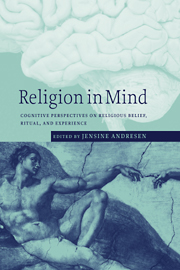Book contents
- Frontmatter
- Contents
- Notes on contributors
- 1 Introduction: towards a cognitive science of religion
- PART I BELIEF ACQUISITION AND THE SPREAD OF RELIGIOUS REPRESENTATIONS
- PART II QUESTIONING THE “REPRESENTATION” OF RELIGIOUS RITUAL ACTION
- PART III EMBODIED MODELS OF RELIGION
- 8 Cognitive study of religion and Husserlian phenomenology: making better tools for the analysis of cultural systems
- 9 Why a proper science of mind implies the transcendence of nature
- 10 Religion and the frontal lobes
- 11 Conclusion: religion in the flesh: forging new methodologies for the study of religion
- Index
8 - Cognitive study of religion and Husserlian phenomenology: making better tools for the analysis of cultural systems
Published online by Cambridge University Press: 02 December 2009
- Frontmatter
- Contents
- Notes on contributors
- 1 Introduction: towards a cognitive science of religion
- PART I BELIEF ACQUISITION AND THE SPREAD OF RELIGIOUS REPRESENTATIONS
- PART II QUESTIONING THE “REPRESENTATION” OF RELIGIOUS RITUAL ACTION
- PART III EMBODIED MODELS OF RELIGION
- 8 Cognitive study of religion and Husserlian phenomenology: making better tools for the analysis of cultural systems
- 9 Why a proper science of mind implies the transcendence of nature
- 10 Religion and the frontal lobes
- 11 Conclusion: religion in the flesh: forging new methodologies for the study of religion
- Index
Summary
What does Husserlian phenomenology contribute to the cognitive study of religion? In discussing the dominant methodologies in cognitive theory I argue that neuropsychological approaches risk losing the cultural aspects of religion, while cultural approaches suffer from the lack of systematic tools and methods with which to study religious experience and the meaning systems involved. In contrast to many other phenomenologies of religion, the Husserlian tradition in phenomenology offers various systematic tools useful in studying the structures of religious meaning systems. Specifically, three important themes are the notion of the descriptive study of cognitive phenomena; the centrality of intentionality; and the theory of wholes and parts, a central component of so-called commonsense ontology.
THE COGNITIVE APPROACH IN THE STUDY OF RELIGION
The cognitive approach to religious phenomena is based on the assumption that religious phenomena are generated by lawful cognitive mechanisms. In other words, religious thinking and doing is generic human functioning and does not differ from other modes of cognition and action. If a mechanism such as Gestalt formation affects the perception of traffic signs, it also affects religious perception. If human memory constructs and distorts courses of events in the case of personal life histories, it does the same in the case of religious remembering.
The postulated cognitive mechanisms are universal, even though they account for diverse religious appearances. The cognitive approach is reductive in the traditional sense inasmuch as religious phenomena are seen to be related to more fundamental mechanisms, such as a set of cross-cultural properties that account for the diversity of religious occurrences.
- Type
- Chapter
- Information
- Religion in MindCognitive Perspectives on Religious Belief, Ritual, and Experience, pp. 193 - 206Publisher: Cambridge University PressPrint publication year: 2001
- 1
- Cited by



